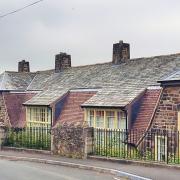John Plowright reviews Hugh Brogan’s A School in England and shines a light on Repton School’s illustrious and varied past.

The creation of the Mercian Regiment on 1st September 2007, from the merger of the Staffordshire Regiment, Cheshire Regiment and the Worcestershire and Sherwood Foresters, was marked by a parade in Tamworth, whilst the tenth anniversary of the regiment’s formation was celebrated in Lichfield.
Perhaps some day there’ll be a parade in Repton too to honour the Regiment’s name and Derbyshire roots.
The dispute as to whether Tamworth, Lichfield or Repton has best claim to be considered Mercian capital is otiose, not only because applying the concept of a capital city to Anglo-Saxon England is anachronistic but also because, as Mercia’s boundaries changed, all three acted at different times as its most important settlement.
What Hugh Brogan’s posthumously published A School in England makes clear, however, is that Repton is not only the site of a school which came to be famed throughout and far beyond Derbyshire, but is also by far the most important archaeological site of the three, not least because of the Viking winter camp there (873-4), subject of almost as many documentaries as there have been digs.

Repton, despite its relative seclusion, is a corner of Derbyshire where the nation’s history has repeatedly been manifested. Thus, as the title of Brogan’s book indicates, Repton’s history can be viewed as representative not just of a particular type of English public school but of much of the nation, and he makes full use of parish and other local records as well as the school archives in painting a masterly portrait of the past.
Sometimes Repton is a corner of Derbyshire only touched tangentially by great national events: plundered for horses during the civil wars of the 17th century or having the First Usher’s allegedly Jacobite sympathies questioned when Bonnie Prince Charlie’s vanguard reached Swarkestone bridge in 1745. At others, its role is central in illuminating Derbyshire and national history: as the first place where Christianity was preached in the Midlands, in 653, a site of burial for Mercian royalty (Kings Aethelbald and Wiglaf and Prince Wystan, who as Saint Wystan made Repton a place of pilgrimage); home to a mass Viking grave; and part of the Dissolution of the Monasteries.
As a school Repton, Brogan says, ‘has always been squarely representative of its sort … middling in size, middling in achievement, seldom giving a lead, seldom lagging in the rear. This representative quality is one of Repton’s chief claims to historical interest.’
Himself a former pupil, Brogan is arguably somewhat harsh in this assessment, as by his own account Repton has led the field on at least four occasions.

Stephenson-Peach’s workshops made Repton the trailblazer in promoting engineering in schools; under Victor Gollancz and D.C. Somervell it similarly pioneered education in citizenship; thanks to what The Times described as ‘a long line of Repton cricketers, with the brothers Palairet and Mr. C.B. Fry at their head’ it was for many years the school to beat at cricket; and most recently, as Brogan states, ‘Repton has established itself as the premier hockey school of all England, winning thirty national championships between 1995 and 2016’ – the figure now stands at forty.
Brogan painstakingly yet wittily chronicles the more prosaic but no less important day-to-day business of the School in moulding and rounding character, transmitting knowledge and communicating skills, which have meant Reptonians have been not only a source of pride to their parents and alma mater but also to their country. One of the most evocative of the book’s photographs shows the Repton Officer Training Corps in the Great War, with a caption bearing the information that of the thirty-seven shown, one would be gassed, fourteen wounded and a further seven killed in action or die of their wounds.
Those looking to explore a rich slice of Derbyshire – and national – life from Mercia to almost the present day could hardly do better than to place themselves in Brogan’s capable hands.
A School in England. The History of Repton (Profile Books) is available from the Repton School Shop and all good booksellers.



























